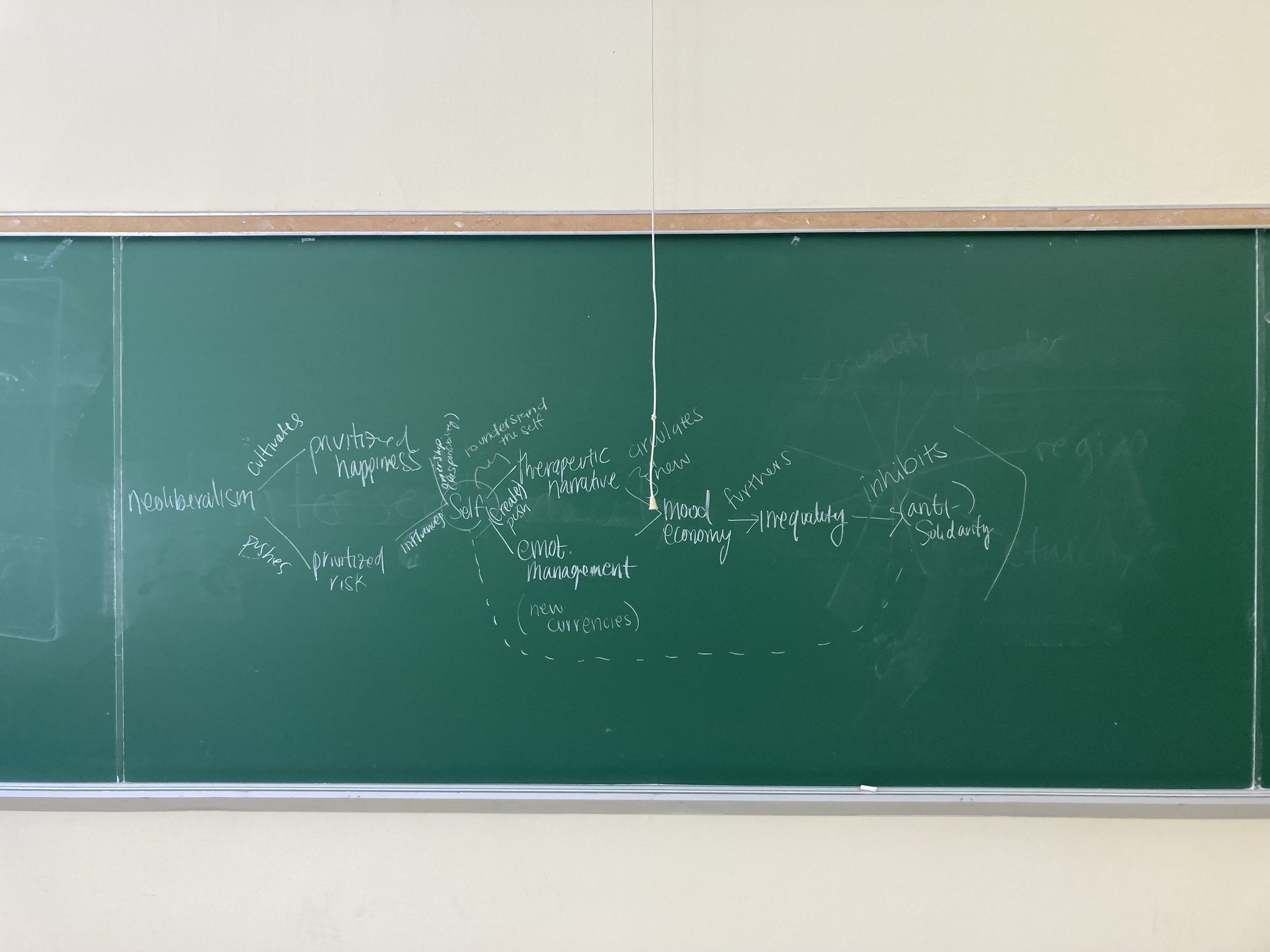
Student diagram of Jennifer Silva’s Coming Up Short (2013)
MGT 678 Understanding and Reducing Bias in Organizations. Teaching Assistant. (Yale University)
MGT 511 Inequality, Systems, and Society. Course Preparation and Teaching Assistance. (Yale University)
SOC 190 Feeling Inequity: Emotion, Culture, and Power in Society. Instructor of Record. Syllabus here. (UC Berkeley)
Course Description: “What is emotion, and what does it do? How is it shaped by society, and how does it shape society in turn? And what does studying emotion from a sociological perspective help us understand about power and inequity? This course approaches the sociology of emotion through an investigation of emotion's relationships with culture and domination. We will review foundational theories in the sociology of emotion, examine tools sociologists use to study emotion, and consider challenges that can arise in doing so. We will explore the relationship between power and emotion by considering emotion in various social contexts. Finally, we will turn our attention to how sociological approaches can help us understand contemporary discourses of emotion, such as that surrounding trauma. As a 190 capstone seminar, this course is also designed to instruct and support participants in the planning, conduct, and presentation of small-scale, original research or an original research synthesis.”
SOC 102 Contemporary Social Theory. Graduate Student Instructor. (UC Berkeley)
SOC 101 Classical Social Theory. Graduate Student Instructor. (UC Berkeley)
SOC 190 Embodying Inequality: Social Stratification and the Body. Reader. (UC Berkeley)
My undergraduate teaching has been recognized with an Outstanding Graduate Student Instructor Award (2019) from the UC Berkeley Sociology Department.
Prior to graduate school, I worked for two years as a certified 7th grade science teacher at a public middle school in Baton Rouge, LA, and served for three years as the founding Director of College Counseling at a public, open-enrollment high school in New Orleans, LA, where I directly counseled over 130 first-generation, Pell-eligible historically marginalized students in their college preparation, application, and selection processes. I also co-founded a college persistence non-profit that has coached over 350 first-generation, Pell-eligible, and historically marginalized students in the Greater New Orleans region.
At Berkeley, I have been fortunate to mentor undergraduate researchers through the Sociology Department Honors Thesis Mentoring Program, the NavCal program for non-traditional students, and the Social Science Research Pathways program at the Institute for Research on Labor and Employment.
Teaching Experience
At its best, education is a practice of freedom, as the late bell hooks wrote. It is co-created by the members of a learning community.
That community engages in a collective project of critical inquiry, animated by deep, challenging questions and grounded by a sense of belonging and shared purpose.
As an educator, I view my instructional role as facilitating and guiding inclusive, rigorous, and interdisciplinary spaces where these statements can be true.
Among others, I use techniques like project-based learning, student-led discussion, critical writing, and the flipped classroom to foster these environments.
In course readings, discussions, and assignments, I help students make connections between social theory and real-world events, problems, and injustices.
I develop students’ thinking and writing skills by providing detailed feedback on iterative writing assignments.
Just as I ask my students to stretch and grow, I seek to do the same by asking for and responding to regular feedback, and by continually learning new content and skills.
As a mentor, I focus on trust and holistic development, supporting students in developing their research, professional well-being, and ability to decode and navigate educational institutions.
I have particular experience and interest in mentoring first-generation, Pell-eligible, and historically marginalized college students.
I take a coaching approach to mentorship, which fosters both connection and autonomy by supporting (rather than directing) students through challenges.
I have deeply benefited from thoughtful, sustained mentorship at important stages of my own development, and I actively seek to pay it forward.